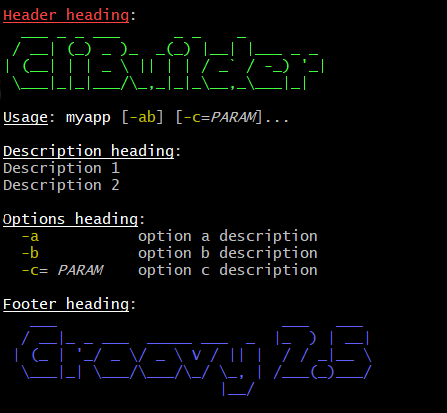Groovy 2.5 CliBuilder Renewal
Apache Groovy 2.5 CliBuilder Renewal
The CliBuilder class for quickly and concisely building command line applications has been renewed in Apache Groovy 2.5.
This article highlights what is new.

The groovy.util.CliBuilder Class is Deprecated
Previous versions of CliBuilder used Apache Commons CLI as the underlying parser library.
From Groovy 2.5, there is an alternative version of CliBuilder based on the picocli parser.
It is recommended that applications explicitly import either groovy.cli.picocli.CliBuilder or groovy.cli.commons.CliBuilder. The groovy.util.CliBuilder class is deprecated and delegates to the Commons CLI version for backwards compatibility.
New features will likely only be added to the picocli version, and groovy.util.CliBuilder may be removed in a future version of Groovy.
The Commons CLI version is intended for applications that rely on the internals of the Commons CLI implementation of CliBuilder and cannot easily migrate to the picocli version.
Next, let’s look at some new features in Groovy 2.5 CliBuilder.
Typed Options

Options can be boolean flags or they can take one or more option parameters.
In previous versions of CliBuilder, you would have to specify args: 1 for options that need a parameter, or
args: '+' for options that accept multiple parameters.
This version of CliBuilder adds support for typed options. This is convenient when processing parse results,
but additionally, the number of arguments is inferred from the type,
so if the type is specified, args can be omitted.
For example:
def cli = new CliBuilder()
cli.a(type: String, 'a-arg')
cli.b(type: boolean, 'b-arg')
cli.c(type: Boolean, 'c-arg')
cli.d(type: int, 'd-arg')
cli.e(type: Long, 'e-arg')
cli.f(type: Float, 'f-arg')
cli.g(type: BigDecimal, 'g-arg')
cli.h(type: File, 'h-arg')
cli.i(type: RoundingMode, 'i-arg')
def argz = '''-a John -b -d 21 -e 1980 -f 3.5 -g 3.14159
-h cv.txt -i DOWN and some more'''.split()
def options = cli.parse(argz)
assert options.a == 'John'
assert options.b
assert !options.c
assert options.d == 21
assert options.e == 1980L
assert options.f == 3.5f
assert options.g == 3.14159
assert options.h == new File('cv.txt')
assert options.i == RoundingMode.DOWN
assert options.arguments() == ['and', 'some', 'more']
Supported Types
The Commons CLI-based CliBuilder supports primitives, numeric types, files, enums and arrays thereof
(using StringGroovyMethods#asType(String, Class)).
The picocli-based CliBuilder supports those and more.
Adding More Types
If the built-in types don’t meet your needs, it is easy to register a custom converter. Specify a convert Closure to convert the String argument to any other type. For example:
import java.nio.file.Paths
import java.time.LocalTime
def cli = new CliBuilder()
cli.a(convert: { it.toUpperCase() }, 'a-arg') // (1)
cli.p(convert: { Paths.get(it) }, 'p-arg') // (2)
cli.t(convert: { LocalTime.parse(it) }, 't-arg') // (3)
def options = cli.parse('-a abc -p /usr/home -t 15:31:59'.split())
assert options.a == 'ABC'
assert options.p.absolute && options.p.parent == Paths.get('/usr')
assert options.t.hour == 15 && options.t.minute == 31
| 1 | Convert one String to another |
| 2 | Option value is converted to a java.nio.file.Path |
| 3 | Option value is converted to a java.time.LocalTime |
Annotations

From this release, Groovy offers an annotation API for processing command line arguments.
Applications can annotate fields or methods with @groovy.cli.Option for named options
or @groovy.cli.Unparsed for positional parameters.
When the parser matches a command line argument with an option name or positional parameter, the value is converted
to the correct type and injected into the field or method.
Annotating Methods of an Interface
One way to use the annotations is on "getter-like" methods (methods that return a value) of an interface. For example:
import groovy.cli.*
interface IHello {
@Option(shortName='h', description='display usage') Boolean help() // (1)
@Option(shortName='u', description='user name') String user() // (2)
@Unparsed(description = 'positional parameters') List remaining() // (3)
}
| 1 | Method returns true if -h or --help was specified on the command line. |
| 2 | Method returns the parameter value that was specified for the -u or --user option. |
| 3 | Any remaining parameters will be returned as a list from this method. |
How to use this interface (using the picocli version to demonstrate its usage help):
import groovy.cli.picocli.CliBuilder
def cli = new CliBuilder(name: 'groovy Greeter')
def argz = '--user abc'.split()
IHello hello = cli.parseFromSpec(IHello, argz)
assert hello.user() == 'abc'
hello = cli.parseFromSpec(GreeterI, ['--help', 'Some', 'Other', 'Args'] as String[])
assert hello.help()
cli.usage()
assert hello.remaining() == ['Some', 'Other', 'Args']
This prints the following usage help message:
Usage: groovy Greeter [-h] [-u=] [...]
[...] positional parameters
-u, --user= user name
-h, --help display usage When parseFromSpec is called, CliBuilder reads the annotations, parses the command line arguments
and returns an instance of the interface.
The interface methods return the option values matched on the command line.
Annotating Properties or Setter Methods of a Class
Another way to use the annotations is on the properties or "setter-like" methods (void methods with a single parameter) of a class. For example:
class Hello {
@Option(shortName='h', description='display usage') // (1)
Boolean help
private String user
@Option(shortName='u', description='user name') // (2)
void setUser(String user) {
this.user = user
}
String getUser() { user }
@Unparsed(description = 'positional parameters') // (3)
List remaining
}
| 1 | The help Boolean property is set to true if -h or --help was specified on the command line. |
| 2 | The setUser property setter method is invoked with the -u or --user option parameter value. |
| 3 | The remaining property is set to a new List containing the remaining args, if any. |
The annotated class can be used as follows:
String[] argz = ['--user', 'abc', 'foo']
def cli = new CliBuilder(usage: 'groovy Greeter [option]') // (1)
Hello greeter = cli.parseFromInstance(new Hello(), argz) // (2)
assert greeter.user == 'abc' // (3)
assert greeter.remaining == ['foo'] // (4)
| 1 | Create a CliBuilder instance. |
| 2 | Extract options from the annotated instance, parse arguments, and populate and return the supplied instance. |
| 3 | Verify that the String option value has been assigned to the property. |
| 4 | Verify the remaining arguments property. |
When parseFromInstance is called, CliBuilder again reads the annotations, parses the command line
arguments and finally returns the instance. The annotated fields and setter methods are initialized with the values
matched for the associated option.
Script Annotations

Groovy 2.5 also offers new annotations for Groovy scripts.
@OptionField is equivalent to combining @groovy.transform.Field and @Option, whereas @UnparsedField is equivalent to combining @Field and @Unparsed.
Use these annotations to turn script variables into fields so that the variables can be populated by CliBuilder. For example:
import groovy.cli.OptionField
import groovy.cli.UnparsedField
@OptionField String user
@OptionField Boolean help
@UnparsedField List remaining
String[] argz = ['--user', 'abc', 'foo']
new CliBuilder().parseFromInstance(this, argz)
assert user == 'abc'
assert remaining == ['foo']
Typed Positional Parameters
This version of CliBuilder offers some limited support for strongly typed positional parameters.
If all positional parameters have the same type, the @Unparsed annotation can be used with an array type other than String[].
Again, the type conversion is done using StringGroovyMethods#asType(String, Class)
in the Commons CLI version, while the picocli version of CliBuilder supports a superset of those types.
This functionality is only available for the annotations API, not for the dynamic API.
Here is an example of an interface that can capture strongly typed positional parameters:
interface TypedPositionals {
@Unparsed Integer[] nums()
}
The code below demonstrates the type conversion:
def argz = '12 34 56'.split()
def cli = new CliBuilder()
def options = cli.parseFromSpec(TypedPositionals, argz)
assert options.nums() == [12, 34, 56]
Apache Commons CLI Features
Sometimes you may want to use advanced features of the underlying parsing library.
For example, you may have a command line application with mutually exclusive options.
The below code shows how to achieve this using the Apache Commons CLI OptionGroup API:
import groovy.cli.commons.CliBuilder
import org.apache.commons.cli.*
def cli = new CliBuilder()
def optionGroup = new OptionGroup()
optionGroup.with {
addOption cli.option('s', [longOpt: 'silent'], 's option')
addOption cli.option('v', [longOpt: 'verbose'], 'v option')
}
cli.options.addOptionGroup optionGroup
assert !cli.parse('--silent --verbose'.split()) (1)
| 1 | Parsing this input will fail because two mutually exclusive options were specified. |
Picocli CliBuilder Features
Strongly Typed Lists

Options with multiple values often use an array or a List to capture the values.
Arrays can be strongly typed, that is, contain elements other than String.
The picocli version of CliBuilder lets you do the same with Lists.
The auxiliaryType specifies the type that the elements should be converted to.
For example:
import groovy.cli.picocli.CliBuilder
def cli = new CliBuilder()
cli.T(type: List, auxiliaryTypes: Long, 'typed list') // (1)
def options = cli.parse('-T 1 -T 2 -T 3'.split()) // (2)
assert options.Ts == [ 1L, 2L, 3L ] // (3)
| 1 | Define an option that can have multiple integer values. |
| 2 | An example command line. |
| 3 | The option values as a List. |
Strongly Typed Maps

The picocli version of CliBuilder offers native support for Map options.
This is as simple as specifying Map as the option type.
By default, both keys and values are stored as Strings in the Map,
but it’s possible to use auxiliaryType to specify the types that the keys and values should be converted to.
import groovy.cli.picocli.CliBuilder
def cli = new CliBuilder()
cli.D(args: 2, valueSeparator: '=', 'Commons CLI style map') // (1)
cli.X(type: Map, 'picocli style map support') // (2)
cli.Z(type: Map, auxiliaryTypes: [TimeUnit, Integer].toArray(), 'typed map') // (3)
def options = cli.parse('-Da=b -Dc=d -Xx=y -Xi=j -ZDAYS=2 -ZHOURS=23'.split()) // (4)
assert options.Ds == ['a', 'b', 'c', 'd'] // (5)
assert options.Xs == [ 'x':'y', 'i':'j' ] // (6)
assert options.Zs == [ (DAYS as TimeUnit):2, (HOURS as TimeUnit):23 ] // (7)
| 1 | Commons CLI has map-like options by specifying that each option must have two parameters, with some separator. |
| 2 | The picocli version of CliBuilder has native support for Map options. |
| 3 | The key type and value type can be specified for strongly-typed maps. |
| 4 | An example command line. |
| 5 | The Commons CLI style option gives a list of [key, value, key, value, …] objects. |
| 6 | The picocli style option gives the result as a Map. |
| 7 | When auxiliaryTypes are specified, the keys and values of the map are converted to the specified types, giving you a Map. |
Usage Help with Detailed Synopsis

CliBuilder has always supported a usage property to display the usage help synopsis of a command:
// the old way
new CliBuilder(usage: 'myapp [options]').usage()
The above program prints:
Usage: myapp [options]
This still works, but the picocli version has a better alternative with the name property.
If you specify name instead of usage, picocli will show all options in a succinct synopsis with square brackets [ and ] for optional elements and ellipsis … for elements that can be repeated one or more times. For example:
// the new way
def cli = new CliBuilder(name: 'myapp') // detailed synopsis
cli.a('option a description')
cli.b('option b description')
cli.c(type: List, 'option c description')
cli.usage()
The above program prints:
Usage: myapp [-ab] [-c=PARAM]... -a option a description -b option b description -c= PARAM option c description
Use Any Option Names

Image credit: (c) PsychoShadow - www.bigstockphoto.com
Before, if an option had multiple names with a single hyphen, you had no choice but to declare the option multiple times:
// before: split -cp, -classpath into two options
def cli = new CliBuilder(usage: 'groovyConsole [options] [filename]')
cli.classpath('Where to find the class files')
cli.cp(longOpt: 'classpath', 'Aliases for '-classpath')
The picocli version of CliBuilder supports a names property that can have any number of option names that can take any prefix. For example:
// after: an option can have many names with any prefix
def cli = new CliBuilder(usage: 'groovyConsole [options] [filename]')
cli._(names: ['-cp', '-classpath', '--classpath'], 'Where to find the class files')
Fine-grained Usage Help Message

Picocli offers fine-grained control over the usage help message format and this functionality is exposed via the usageMessage CliBuilder property.
The usage message has a number of sections: header, synopsis, description, parameters, options and finally the footer. Each section has a heading, that precedes the first line of its section. For example:
import groovy.cli.picocli.CliBuilder
def cli = new CliBuilder()
cli.name = "groovy clidemo"
cli.usageMessage.with { // (1)
headerHeading("Header heading:%n") // (2)
header("header 1", "header 2") // (3)
synopsisHeading("%nUSAGE: ")
descriptionHeading("%nDescription heading:%n")
description("description 1", "description 2")
optionListHeading("%nOPTIONS:%n")
footerHeading("%nFooter heading:%n")
footer("footer 1", "footer 2")
}
cli.a(longOpt: 'aaa', 'a-arg') // (4)
cli.b(longOpt: 'bbb', 'b-arg')
cli.usage()
| 1 | Use the usageMessage CliBuilder property to customize the usage help message. |
| 2 | Headings can contain string format specifiers like the %n newline. |
| 3 | Sections are multi-line: each string will be rendered on a separate line. |
| 4 | Define some options. |
This prints the following output:
Header heading: header 1 header 2 USAGE: groovy clidemo [-ab] Description heading: description 1 description 2 OPTIONS: -a, --aaa a-arg -b, --bbb b-arg Footer heading: footer 1 footer 2
Usage Help with ANSI Colors
Out of the box, the command name, option names and parameter labels in the usage help message are rendered with ANSI styles and colors.
The color scheme for these elements can be configured with system properties.
Other than that, you can use colors and styles in the descriptions and other sections of the usage help message,
using a simple markup notation. The example below demonstrates:
def cli = new groovy.cli.picocli.CliBuilder(name: 'myapp')
cli.usageMessage.with {
headerHeading("@|bold,red,underline Header heading|@:%n")
header($/@|bold,green \
___ _ _ ___ _ _ _
/ __| (_) _ )_ _(_) |__| |___ _ _
| (__| | | _ \ || | | / _` / -_) '_|
\___|_|_|___/\_,_|_|_\__,_\___|_|
|@/$)
synopsisHeading("@|bold,underline Usage|@: ")
descriptionHeading("%n@|bold,underline Description heading|@:%n")
description("Description 1", "Description 2") // after the synopsis
optionListHeading("%n@|bold,underline Options heading|@:%n")
footerHeading("%n@|bold,underline Footer heading|@:%n")
footer($/@|bold,blue \
___ ___ ___
/ __|_ _ ___ _____ ___ _ |_ ) | __|
| (_ | '_/ _ \/ _ \ V / || | / / _|__ \
\___|_| \___/\___/\_/ \_, | /___(_)___/
|__/ |@/$)
}
cli.a('option a description')
cli.b('option b description')
cli.c(type: List, 'option c description')
cli.usage()
The code above gives the following output:

(Credit to http://patorjk.com/software/taag/ for the ASCII art.)
New errorWriter Property

When the user provided invalid input, the picocli version of CliBuilder writes an error message and the usage help message to the new errorWriter property (set to System.err by default).
When the user requests help, and the application calls CliBuilder.usage(), the usage help message is printed to the writer property (System.out by default).
Previous versions of CliBuilder used the writer property for both invalid input and user-requested help.
Why this change? This helps command line application authors to follow standard practice and separate diagnostic output from the program output: If the output of a Groovy program is piped to another program,
sending error messages to STDERR prevents the downstream program from inadvertently trying to parse error output.
On the other hand, when users request help with --help or --version, the output should be sent to STDOUT,
because the user may want to pipe the output to a utility like less or grep.
For backwards compatibility, setting the writer property to another value will also set the errorWriter to the same value.
(You can still set the errorWriter to another value afterwards if desired.)
Gotchas/Incompatibilities

There are a few areas where the new versions of CliBuilder are not compatible with previous versions or with each other.
Properties options and formatter Unavailable in Picocli Version
The Commons CLI version of CliBuilder, and previous versions of CliBuilder, expose an options property of type org.apache.commons.cli.Options, that can be used to configure the underlying Commons CLI parser without going through the CliBuilder API. This property is not available in the picocli version of CliBuilder.
Applications that read or write this property must import groovy.cli.commons.CliBuilder
or modify the application.
Additionally, the formatter property of type org.apache.commons.cli.HelpFormatter is not available in the picocli version of CliBuilder. If your application uses this property, consider using the usageMessage property instead, or import groovy.cli.commons.CliBuilder.
Property parser Differs in Picocli and Commons CLI Versions
The picocli version of CliBuilder has a parser property that exposes a picocli.CommandLine.Model.ParserSpec object
that can be used to configure the parser behavior.
The Commons CLI version of CliBuilder, and previous versions of CliBuilder, expose a parser property of type org.apache.commons.cli.CommandLineParser. This functionality is not available in the picocli version of CliBuilder.
If your application uses the parser property to set a different Commons CLI parser, consider using the posix property instead, or import groovy.cli.commons.CliBuilder.
Different Parser Behavior for longOption
The Commons CLI DefaultParser recognizes longOption option names prefixed with a single hypen (e.g., -option)
as well as options prefixed with a double hyphen (e.g., --option).
This is not always obvious since the usage help message only shows the double hyphen prefix for longOption option names.
For backwards compatibility, the picocli version of CliBuilder has an acceptLongOptionsWithSingleHyphen property:
set this property to true if the parser should recognize long option names with both
a single hyphen and a double hyphen prefix. The default is false,
so only long option names with a double hypen prefix (--option) are recognized.
Conclusion
Groovy 2.5 CliBuilder offers a host of exciting new features. Try it out and let us know what you think!
For reference: Groovy site and GitHub project,
picocli site and picocli GitHub project. Please star the projects if you like what you see!
A copy of this article was previously published on the picocli web site.
See the original article here.